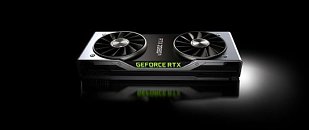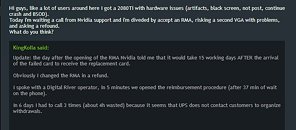Wednesday, October 31st 2018

NVIDIA Confirms Issues Cropping Up With Turing-based Cards, "It's Not a Broad Issue"
It has been been making the rounds now on various forum sites (including our own TPU) that problems have been cropping up for users of NVIDIA's Turing-based architecture graphics cards. The reports, which are increasing in number as awareness of the issue increases, vary in their manifestation, but have the same result: "crashes, black screens, blue screen of death issues, artifacts and cards that fail to work entirely," as reported by the original Digital Trends piece.
Of course, at the time, problems with the source for the information were too great to properly discern whether or not this issue stood beyond the usual launch issues and failures that can (and will happen) to any kind of hardware. The fact that people with negative experiences would always be more vocal than those without any problem; the fact that some accounts on the reported forums were of doubtful intent; and that the same user could be posting across multiple forums would always put a stop to any serious measurement of the issue. Now, though, NVIDIA has come out with a statement regarding the issue, which at least recognizes its existence.Problems have been cropping up with both NVIDIA-made and AIB cards from various manufacturers, which seemingly rejects the possibility for manufacturer-based issues, and leaves on the table either an architectural or manufacturing batch issue (no confirmations yet). Let's hope this really is confined to a batch issue, though there have been multiple reports of users that got their cards RMA'd and then got one or two replacements that met ther same fate). The issue seems to be affecting owners of the flagship RTX 2080 Ti the most, though there are reports of 2080 models being affected as well.In response, NVIDIA acknowledges the issue, but limits its relevance: as reported by Tom's Hardware, the company said that "it's not an increasing number of users" affected by this problem, saying "it's not broad." It then added that "we are working with each user individually like we do always." We're here to wait and see, but this definitely doesn't do any favors in grabbing more sales for the RTX 20-series, when the flagship graphics card costing over $1,000 fails on users.
Sources:
GeeksULTD, via Tom's Hardware, GeForce Forums, GeForce Forums, Forbes, TechPowerupForums
Of course, at the time, problems with the source for the information were too great to properly discern whether or not this issue stood beyond the usual launch issues and failures that can (and will happen) to any kind of hardware. The fact that people with negative experiences would always be more vocal than those without any problem; the fact that some accounts on the reported forums were of doubtful intent; and that the same user could be posting across multiple forums would always put a stop to any serious measurement of the issue. Now, though, NVIDIA has come out with a statement regarding the issue, which at least recognizes its existence.Problems have been cropping up with both NVIDIA-made and AIB cards from various manufacturers, which seemingly rejects the possibility for manufacturer-based issues, and leaves on the table either an architectural or manufacturing batch issue (no confirmations yet). Let's hope this really is confined to a batch issue, though there have been multiple reports of users that got their cards RMA'd and then got one or two replacements that met ther same fate). The issue seems to be affecting owners of the flagship RTX 2080 Ti the most, though there are reports of 2080 models being affected as well.In response, NVIDIA acknowledges the issue, but limits its relevance: as reported by Tom's Hardware, the company said that "it's not an increasing number of users" affected by this problem, saying "it's not broad." It then added that "we are working with each user individually like we do always." We're here to wait and see, but this definitely doesn't do any favors in grabbing more sales for the RTX 20-series, when the flagship graphics card costing over $1,000 fails on users.




127 Comments on NVIDIA Confirms Issues Cropping Up With Turing-based Cards, "It's Not a Broad Issue"
That is why new GPU start off with smaller nodes e.g. 2080/2070. In this case they rushed 2080 Ti on released date unlike previous generations.
I am sorry if my FERMI joke triggered :laugh: you this bad. But staying on topic it seems like quality assurance really lacked this time around.
LOL, you deleted your posts trying to defend your point......... LOLOLOL
No more, back and forth, retaliatory comments.
Thank You.
For the money outlay, they should be perfect.
I was choking on the prices of these things anyway.
Maybe it's bad Joss, or maybe, (just maybe) it's Karma slapping them around for their over the top greed. :nutkick:
These chips are some of the biggest ever, which is why yields are poor. I'm sure the process can improve over time, but that doesn't excuse an unreasonably large number of bad parts being shipped out (if that is indeed the case).2080Ti are more susceptible to failure than cheaper cards because they're more complex. As I said above, though, that still doesn't excuse poor QC.
Unless you enjoy showing your irrational hate of "the enemy" NVIDIA as well as your deficient IQs, how's about y'all quiet down and wait for more concrete facts to be released before making fools of yourselves.
It appears that the GDDR6 on most of these cards is specified at 1750MHz and that's what they are already clocked at out of the box.
Guru3D - Manufacturers roll out firmware updates for GeForce GTX 1070 due to memory Issues
QC may not be entirely to blame either. Quality Control needs time to properly test in all possible scenarios, tossing variables into the mix and observing the results. This takes a lot of time.
With this happening with the 2080s and 2080Ti cards, I'm wondering if they tested as thoroughly as they ~could~ have.
Companies are getting into a rush to market mentality akin to throwing products on the wall to see what sticks. They're more than happy to fix the screw-ups, but this comes at the expense of customer inconvenience. (and possible downtime)
People are getting pissed off that for such a huge outlay of money, there are any issues at all. There shouldn't be. Lots of folks sell off their existing premium hardware to partially fund buying the shiny, new stuff that we (think we) want. Then, we have nothing to fall back to when unnecessary crap like this crops up.
I'm glad that I didn't buy into 20 series cards yet.
But this is,.....
www.guru3d.com/news-story/middle-earth-shadow-of-mordor-geforce-gtx-970-vram-stress-test,12.htmlAs far as 2xxx series problems, don't know if it's a fixable issue or not... to early to tell. But here's the deal ... if you want to be a "beta tester" and pay a premium to be the 1st one on your block with th enew shiny thing, then take the punches which will come when you make that choice. It happens with early steppings of CPUs, MoBos, GFX cards, SSDs ... you name it. The folks we built for rarely if ever got hammered by any of these because we have always recommended not investing in hardware that isn't a few steppings into production
a) pre B3 stepping P68 boards .. Intel chipset fail affected all brands ... industry wide recall
b) pre C1 stepping Asus ToG boards (external devices don't wake up from sleep. Asus said tough noogies
c) EVGA 970 early SC boards ... 1/3 of HD missed GPU ... EVGA said, yeah we designed it that way.
d) EVGA early SC / FTW 1060 - 1080 boards ... were going up in smoke because of missing thermal pads. Did the right thing gave owners thermal kitss that required 90 minutes of their time and effort to install
e) MSI tape adhesive on 900 series... users sometimes damaged fans taking off cause adhesive was too strong. Replaced the cards but owners still had he RMA hassle.
There's a reason it's called the bleeding edge ... early adopters have to expect to take a few punchers and will bleed a bit. Most manufacturers address them religiously ... some (i.e, Asus RoG line) often abandon their users (System time freeze bug, audio bugs, sleep bug for example) where they promise an upcoming fix that never arrives. I understand these folks frustration and wouldn't want to be there. The paid good money ... better said they overpaid because they were anxious and they deserved to get a functioning product. No doubt the vendors will make good with RMA replacements if a fix is not forthcoming. But they could have avoided this by making wiser choices. Show patience, loose the need to be the 1st on the block to impress ya friends and wait a bit. ..
a) You'll pay less
b) You will get a product in which bugs in early steppings will be history
c) Your likelihood of having to make repeated TS calls and deal with RMA is significantly less
d) You will likely see performance improvements as more mature production lines have better yields
I am a bit concerned as many users are sitting and waiting, putting off new builds till the 9xxx series CPUs, Z390 boards and RTX cards weed out their bugaboos. Normally, they'd be cutting loose right after the holidays. But on jan 1, us US folks will see tariffs tripe to 30% on electronics aso there's gonna be a huge crush on vendors to keep up with supply after the holidays.